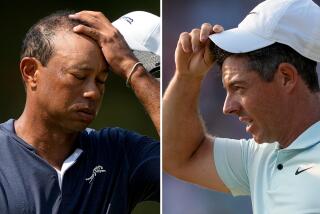GOLF / THOMAS BONK : For Azinger, Birdies Aren’t Everything
- Share via
For those professional athletes who feel invincible, who think it will never end, listen to Paul Azinger.
“We all think we’re in control of our lives, but we’re not,” Azinger said.
Eight months after learning he had a cancerous tumor, it may be that Azinger, at 34, has a better understanding of his own life now.
He has completed radiation treatments and an unexpected out-patient surgical procedure to remove a fatty tumor in his shoulder.
“I’m encouraged, I’m cured,” he said.
“I’m thankful when I wake up and can see the ceiling. A lot of people take sight for granted.”
Azinger is planning on resuming his career at the PGA Championship Aug. 11-14 at Southern Hills Country Club in Tulsa. He is the defending champion.
“I probably wouldn’t have targeted the PGA for my return if I wasn’t the defending champ,” he said.
There had been speculation that Azinger might start his comeback this week at the New England Classic, which he also won last year, but the surgery set him back three weeks.
Azinger did stop by Pleasant Valley Country Club in Sutton, Mass., to say hello. For the rest of his life, he said, he will know how fortunate he has been.
“I’m eternally grateful to those who went before me,” Azinger said. “Lymphoma kills.
“I’ve realized how easy it is to lift someone’s spirits by just writing or saying something. I’ve got a new calling--I need to be an inspiration to people. I have a chance to reach out.”
As for his golf game, Azinger says he has been spending a lot of time at work with clubs in his hands.
“If I don’t chip good, it’s not because of lack of practice,” he said. “My swing isn’t pretty, but it repeats.”
Azinger said he hit his first three-irons, three-woods and drivers last Tuesday. He said he didn’t hit them very well, but he hit them hard and felt no discomfort.
“I have no pain in my shoulder whatsoever,” he said.
As for what he expects to do on the course, Azinger said he has learned a lot about expectations.
“I feel like I’ll be as competitive as ever,” he said. “I know initially it will be tough to concentrate with all the attention.”
Maybe, but for inspiration, all Azinger has to do is look at himself.
*
High Price: How confident was Nick Price in his putting at the British Open?
Apparently a lot more than he was at the U.S. Open when he put five putters in his bag. At Turnberry, Price had only one.
*
More Price: For what it’s worth, in his two previous majors, Price finished 35th at the Masters and missed the cut at the U.S. Open.
*
It’s mental, right? What percentage of golf is physical and what percentage is mental?
“That’s the million-dollar question, isn’t it?” said Patrick J. Cohn, a sports psychologist in Naples, Fla.
“You ask any player, if you’ve got a good swing, it’s 80% mental,” he said.
Cohn is part of an expanding breed of golf helpers in the clinical field, even if his clinic is the golf course. He works with PGA Tour golfers Trevor Dodds, Grant Waite and Kelly Gibson and consults with players on the LPGA, Nike and Asian tours.
Cohn earned a doctorate in sports psychology at the University of Virginia and taught the subject at Miami of Ohio and North Texas and is the author of two books--”The Mental Game of Golf” and “Mind Power Putting.”
The key to staying on top of your golf game is to maintain your confidence, Cohn said.
“Players need to learn to accept mistakes and be a little more kind to themselves,” he said.
To golfers who doubt the value of a sports psychologist, Cohn said they may be confused by his job label.
“When some people hear psychologist, they think we are shrinks and analysts,” he said. “I’m just another person on the support team. I’m the mental coach.”
More to Read
Go beyond the scoreboard
Get the latest on L.A.'s teams in the daily Sports Report newsletter.
You may occasionally receive promotional content from the Los Angeles Times.










